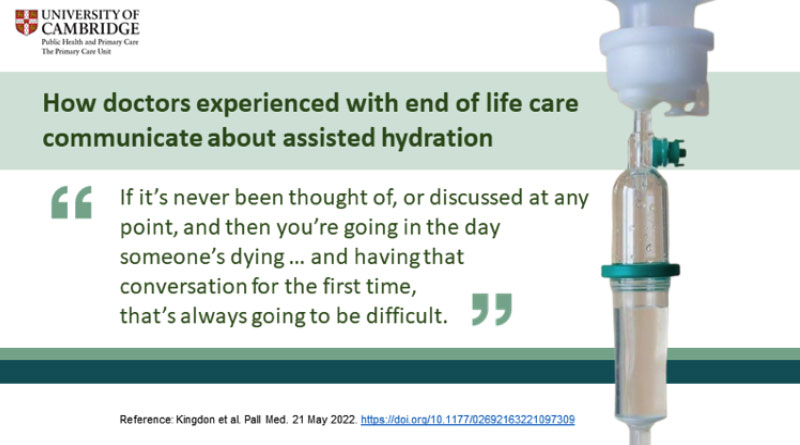Research Reveals on Why Assisted Hydration for Patients Near the End of Life is Difficult for Doctors to Discuss with Patients and Families
Assisted hydration at the end of life is a highly emotive topic. Some may remember negative headlines about the Liverpool Care Pathway (LCP), many of which focused on poor communication and practice relating to the use of assisted hydration. Although the LCP was withdrawn some years ago, recent data suggest that conversations about assisted hydration are only documented in the medical notes for 9% of dying people and 30% of their families.
This new research looks at how doctors communicate and make decisions about assisted hydration near the end of life. It indicates that rigid workplace cultures, clinical uncertainties, wide variations in opinion and ethical quandaries all play a part in making these conversations challenging.
For this study, Dr Kingdon, Specialist Registrar in Palliative Medicine and Academic Clinical Fellow at the Primary Care Unit, carried out in-depth interviews with 16 doctors experienced with end of life care from several hospitals and hospices.
Most of the doctors interviewed recognised the benefits of discussing hydration proactively, but reported that they faced difficult decisions about timing and what exactly to talk about, including whether it is necessary to mention assisted hydration in every case. NICE guidance suggests that this should happen, but this was at odds with many interviewees’ personal practice.
Dr Kingdon explained: “There are so many nuances to take into account. It was clear that participants wanted to empower their patients to be active partners in shared decision-making about their care. But they didn’t want to burden their patients with unnecessary decisions about concerns that might not be relevant to them, when these patients are already very fatigued. The interviews really showed this tension between wanting to involve patients and not wanting to burden them or over-medicalise their deaths”.
Deciding about assisted hydration
The participants in the study described a complex series of factors that influenced their decisions about assisted hydration. Factors included the patient’s condition, whether they are judged likely to benefit, the degree of prognostic uncertainty, what families are experiencing, where the patient is and where they wish to be, and what others in the healthcare team are used to as part of their notion of ‘normal’ practice.
All the participants in the study had encountered situations in which the family of the dying person requested assisted hydration, but where participants felt clinical benefit from assisted hydration was unlikely. This situation is ethically challenging and almost all participants described that they would be willing to start a time-limited trial of assisted hydration in this situation – possibly for ‘buying time’ for family to adjust to the dying process.
This gave Dr Kingdon pause for thought: “I had wondered whether doctors might stick quite rigidly to ideas about “best interests” decision-making and refuse to give assisted hydration in these situations. But actually it seems that the interviewees were happy to include families’ views in their decision-making process, which is actually probably more in keeping with what patients would want, given what we know from previous research”.
Discussing hydration with patients and families
Participants said they relied on tried and tested techniques to help them have these difficult conversations. Many participants said they aim to make sure that there was an understanding that the patient was likely to die before opening up discussions concerning hydration. The hospice-based participants tended to emphasise that it’s normal to take less by mouth toward end of life. One said: “I very often explain that people’s feeling of hunger and thirst diminishes in the dying period.”
Many participants said they took time to build rapport and trust, and they aimed to listen rather than launching into prepared explanations. Tailoring care for each individual was the biggest concern. While most participants said they feel assisted hydration is rarely clinically beneficial for dying people, blanket decisions must be avoided. The conversation is seen as one where there is “real potential to upset the person you’re talking to.”
The research also highlighted overarching cultural issues that influence practitioners, patients and families.
“In Asian culture everything centres around food and drink… it underpins all of the social norms and it’s how people show that they love somebody or appreciate somebody… it’s analogous to, you know, you have a relative that’s constantly trying to feed somebody when they’re dying, it’s because that’s their way of expressing love,” said one palliative medicine consultant.
“This area of practice is challenging even for senior clinicians with experience in end of life care. The topic of hydration near the end of life is of great importance to families, and poor communication or decision-making about hydration can result in drastically negative consequences,” said Dr Kingdon.
He added: “Hospital-based practitioners may need reminding that active treatment until death is not always the right course of action; hospice-based professionals may need reminding that it is not always wrong. Our research shows how clinicians are handling the challenges of assisted hydration as they strive to provide individualised care for all their patients, and provides food for thought for doctors from any specialty who might be involved in conversations of this nature.”






